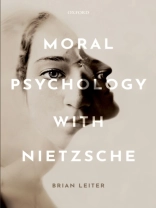Brian Leiter defends a set of radical ideas from Nietzsche: there is no objectively true morality, there is no free will, no one is ever morally responsible, and our conscious thoughts and reasoning play almost no significant role in our actions and how our lives unfold. Leiter presents a new interpretation of main themes of Nietzsche’s moral psychology, including his anti-realism about value (including epistemic value), his account of moral judgment and itsrelationship to the emotions, his conception of the will and agency, his scepticism about free will and moral responsibility, his epiphenomenalism about certain kinds of conscious mental states, and his views about the heritability of psychological traits. In combining exegesis with argument, Leiter engagesthe views of philosophers like Harry Frankfurt, T. M. Scanlon, and Gary Watson, and psychologists including Daniel Wegner, Benjamin Libet, and Stanley Milgram. Nietzsche emerges not simply as a museum piece from the history of ideas, but as a philosopher and psychologist who exceeds David Hume for insight into human nature and the human mind, repeatedly anticipates later developments in empirical psychology, and continues to offer sophisticated and unsettling challenges to much conventionalwisdom in both philosophy and psychology.
Brian Leiter
Moral Psychology with Nietzsche [PDF ebook]
Moral Psychology with Nietzsche [PDF ebook]
Acquista questo ebook e ricevine 1 in più GRATIS!
Lingua Inglese ● Formato PDF ● Pagine 224 ● ISBN 9780192571786 ● Casa editrice OUP Oxford ● Pubblicato 2019 ● Scaricabile 3 volte ● Moneta EUR ● ID 7037594 ● Protezione dalla copia Adobe DRM
Richiede un lettore di ebook compatibile con DRM












